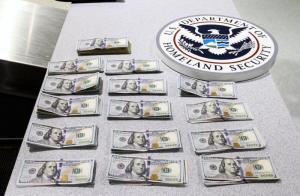The first few weeks of February 2024 saw a lot of cash seizure activity for CBP at Dulles airport, which is basically the norm. Most of the stories publicized by CBP as money seizures from your ordinary traveler (and not your US-Mexico drug/cash smuggling travelers) is coming out of Dulles airport, very near to Washington DC.
In the summary of cash seizure activity, there were a total of 6 cash seizures running from February 7 to February 24 and the total amount seized was $167,257. The original release is here, with the important parts and my comments below:
STERLING, Va. – U.S. Customs and Border Protection officers seized more than $167,000 in unreported currency during six separate seizures in February at Washington Dulles International Airport. [ . . . ]
CBP officers routinely conduct outbound examinations on departing international flights to ensure that all travelers comply with U.S. laws and regulations, including federal currency reporting requirements. During these departure inspections, CBP officers allow travelers multiple opportunities to truthfully report all currency in their possession through both a verbal and a written declaration.
Sometimes, CBP officers or CBP currency detector dogs discover unreported or bulk currency, such as in the following six seizures.
-
- On February 24, CBP officers seized $26,300 in unreported currency from a traveler boarding a flight to Brussels, Belgium. CBP canine Cato alerted to the currency.
- On February 21, CBP officers seized $18,949 in unreported currency from a traveler boarding a flight to Jedda, Saudi Arabia. CBP canine Fuzz, a 4-year-old male yellow labrador retriever, alerted to the currency. Fuzz is also trained to detect firearms and ammunition and has worked at Dulles airport for about 2.5 years.
- On February 19, CBP officers seized $45,009 in unreported currency from a traveler boarding a flight to Brussels, Belgium. CBP canine Fuzz alerted to the currency.
- On February 16, CBP officers seized $26,256 in unreported currency from a traveler boarding a flight to Accra, Ghana. CBP canine Cato alerted to the currency.
- On February 13, CBP officers seized $38,150 in unreported currency from a traveler boarding a flight to Brussels.
- On February 7, CBP officers seized $12,593 in unreported currency from a traveler boarding a flight to Accra.
“We know that airlines are focused on quickly onboarding their international passengers and so currency detector dogs are instrumental in assisting Customs and Border Protection officers enforce our nation’s currency reporting laws while also getting aircraft out on time,” said Marc E. Calixte, Area Port Director for CBP’s Area Port of Washington, D.C. “These seizures should also be a reminder to travelers that they can board their flight quicker and with all their money in their possession if they truthfully report it all to a CBP officer.”
Travelers who fail to truthfully report all of their currency risk severe consequences, including missing their flight and interrupting vacation plans, to seeing all their currency seized by a CBP officer, to facing potential criminal prosecution for bulk currency smuggling.
Unreported bulk currency may sometimes be the proceeds of illegal activity, such as financial fraud and money scams. Greed may also cause some travelers to smuggle unreported currency that they may have lawfully attained to shield it from family or business partners.
CBP officers and agents seized an average of about $217,700 in unreported or illicit currency every day during 2022 along our nation’s borders.
Has Dulles CBP seized your money and ruined your vacation?
If Dulles CBP has seized your money, we urge you to call us for a consultation before considering doing it yourself. You probably will not be happy with the outcome if you do, based on Dulles’ aggressive posture in most cases. Read our trusted customs money seizure legal guide (or watch the videos) and can contact us for a free currency seizure consultation by clicking the contact buttons on this page.














